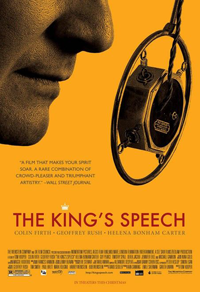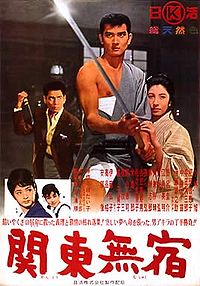
![]()
![]()
![]()
![]()
![]()
Directed by Tom Hooper.
Written by David Seidler.
Starring Colin Firth, Geoffrey Rush, Helena Bonham Carter, Guy Pearce, and Derek Jacobi.
The King’s Speech is the tale of the not-yet-crowned King George VI and his speech therapist. I know, it sounds extraordinarily dull, right? Except that it’s not.
Crackling dialogue and an absolutely stunning performance by Colin Firth make this a English production a riveting crowd-pleaser in the best sense of the term. Firth’s work masterfully sidesteps any cynical “poor little rich boy” resistance you might have, utterly humanizing Prince Albert, the Duke of York, who was born second in line to the throne and unexpectedly crowned after a royal scandal — just in time for England to get pulled into World War II. (The trailer is all you need in the way of plot synopsis.) As you can imagine, a Duke needs to speak publicly every now and then (and certainly a King does), so — speech therapy to the rescue!
“Bertie” and his therapist Lionel Logue (Geoffrey Rush, who also produced) are the warm, fuzzy heart of the film, and its their interactions that make The King’s Speech such a joy to watch, but a host of ace supporting players fill out the film beautifully, most notably Helena Bonham Carter as Bertie’s wife.
History buffs may smirk a bit at the seriousness of “Bertie’s” stammer; by most of the accounts I could find online, his stammer was never so bad as depicted in the film, and even so, Logue’s treatment had allowed him to speak publicly without a stammer (or without much of one) within a couple of years. Most of the facts behind the film do, in some loose sense or another, seem to be faithful to the truth, but it is more than a bit exaggerated in the dramatization. It’s a movie, after all, not a documentary.
Movie buffs will definitely smirk at the slightly too familiar story points: the set-up, treatment, growing friendship, a setback and a falling out, and then, of course, patching things up just before the critical moment (the titular King’s speech). Whether these are based on real events or simply dramatic inventions, I can’t say for sure, but the strength of the dialogue and the performances make it all ring true, at least for the duration of the film.
The King’s Speech is rated R for a bit of language (the S-word and the F-bomb are dropped multiple times, mostly in one scene related to the Duke’s therapy). There is no sex or violence in the film, and even just a bit of implied impropriety. Frankly, it’s absurd that this film is rated R; it’s absolutely a family film on every level. If the film isn’t playing near you yet, it will be soon.

 Twenty-five of the 33 surviving features by Yasujiro Ozu comprise the current retrospective of the brilliant Japanese filmmaker’s career at theÂ
Twenty-five of the 33 surviving features by Yasujiro Ozu comprise the current retrospective of the brilliant Japanese filmmaker’s career at the  Wings of Desire
Wings of Desire Underworld Beauty
Underworld Beauty